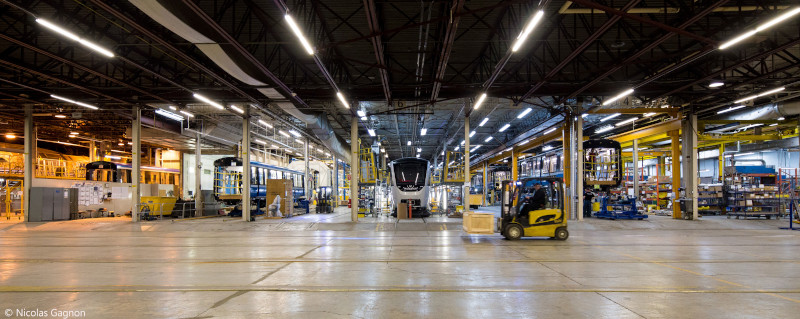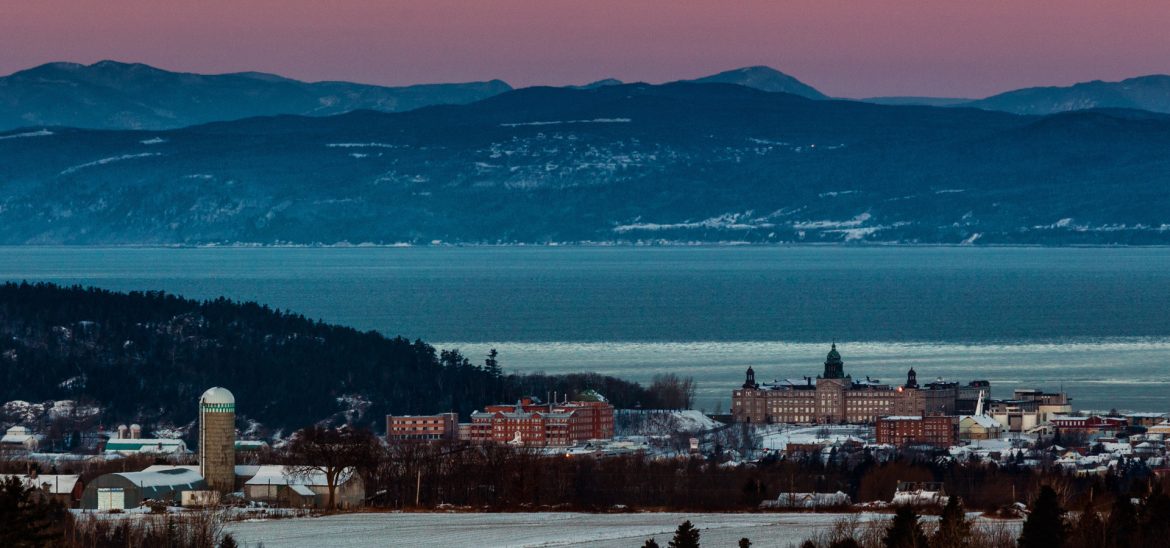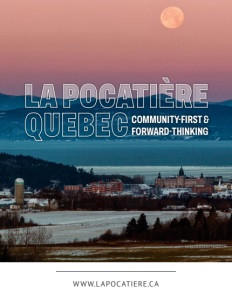La Pocatière, Quebec
Community-First and Forward-Thinking
A Small City with Big Opportunities
In the Bas-Saint-Laurent region of Quebec, along the southern shore of the Saint Lawrence River, lies La Pocatière, a quaint city, with much to offer. With 4,000 residents, the daytime population of the community swells, drawing an additional 2,500 people to work in the city’s vibrant industries. Overall, La Pocatière boasts a unique blend of rural tranquility and urban amenities, making it an attractive place to live, work, and visit.
Cédrick Gagnon, General Director of the City of La Pocatière, illustrates, “It’s really interesting because we have all the services of a big city, even though we are small. We have access to the St. Lawrence River, access to forest paths and mountains. On the other side, we also have a hospital, we have two college education centers, and all the local services that we need in everyday life, less than 5 minutes on foot or at worst, by car. So, it’s just like living in a neighborhood located in a big city, without the problems of a big one!”
Economic Vibrancy
La Pocatière prides itself on being a hub of innovation and industry, anchored by key employers like Alstom, a multinational company specializing in mass transit systems, as metro, train or tramway. This facility employs over 400 skilled workers and is an important economic driver for the region. The expertise of the “Pocatois” in this technological field has been exported to large cities such as the subways and trains of New York, New Jersey, Philadelphia, Boston and Mexico, to name just a few. some. The entire Montreal metro and some Toronto and Vancouver tram cars are also in the portfolio of community workers.
“La Pocatière is also well known as a city of knowledge and innovation,” shares Economic Development Director, Joël Bourque, who highlights the community’s efforts in research, specifically related to agri-food production. The Institut de technologie agroalimentaire du Québec (ITAQ), is a major player in La Pocatière, involved in the research and development of agri-food technologies, with a focus on improving agricultural practices, food processing techniques, and sustainable farming methods.
Centre de développement bioalimentaire du Québec (CDBQ) is another pivotal facility, fostering innovation in the agri-food sector. It boasts state-of-the-art laboratories and facilities that support the development of cutting-edge products in agriculture and bio-food. Noting that the city is home to other research centres, Bourque adds, “It’s not fundamental research, we don’t have a university, but we have research centers in the field of manufacturing processes, bio-food, and agri-food production. We are a microcosm in a field of innovation.”
This access to research, technology, and solutions, attracts industries from Quebec, the Maritimes, and the United States to the region. Gagnon asserts, “What people need to understand about us is that we are sitting on a gold mine. We have a skilled workforce with high levels of expertise, major cutting-edge institutions and many high-tech well-paying jobs. Overall, the great development potential is there. All that remains is for investors to believe in our potential and the magic will happen”.

Industry and Business Attraction
Shortly, La Pocatière hopes to attract another big banner supermarket to fulfill the needs of the growing community. “We have one already, but we have a market that can support two major grocery stores,” Bourque remarks, hinting that the city hopes to have good news on this front very soon. A project is currently underway, and we are impatiently awaiting its positive outcome. La Pocatière lost its second supermarket last year, and this is felt in the community.
Industry-wise, he says, “Our main focus is attracting innovative businesses. What is special here is we have a bunch of technological enterprises which work closely with our research centre.” He mentions some of the many diverse products manufactured in the city, including Inovaweld’s laser-welded stainless-steel barrel used to transport wine and maple syrup. “Laser Welding is one of our great, great innovations here,” Bourque reports. “We’re not in the sector of a massive industry. We are in the sector of clean, technological industries, who employ engineers and technicians.” Moreover, a new industrial development in bio-food technology is ready to accommodate new industries in this sector of activity, which wish to evolve in a rural environment, while benefiting from the expertise and experience of the area.
Infrastructure and Quality of Life
As for quality of life amenities, La Pocatière’s Centre Bombardier welcomes residents to participate in a variety of indoor recreation activities, as well as offering community space for meetings and gatherings. In addition, the city is rich with outdoor options, including a variety of scenic walking and biking paths.
In terms of infrastructure, Gagnon says, “To be frank, it’s a little bit old. We have to move forward with renewing it. We are not alone in Quebec, a lot of cities are in the same situation.” He shares that since the new Council took its position in 2021 they have been looking at ways to upgrade the aging city assets. Currently, an investment of $5 million is being put toward the renewal of the main street, the first part of a three-phase project which will include updates to all of the underground infrastructure as well as streetscape beautification. Another major project consists of revitalizing an old building, which was the arena in the 1970s, and which the community now wishes to make into a modern multi-sport building, allowing it to accommodate numerous indoor practices. This project, estimated at $12 million, is awaiting approval of a grant from the Government of Quebec.
In addition, Mayor Vincent Bérubé proudly announces the upcoming arrival of 20 new daycare spaces. “We worked in collaboration with a private residence for the elderly, to create new places for little ones. It’s very interesting, because it will create bi-generational meetings and will undoubtedly disrupt, in a funny way, the daily lives of those residents, in sharing their space with a kindergarden.” What’s more, Mr. Berubé has given himself the mission of “greening” the city, through initiatives such as the new Tree Policy, an annual budget for tree planting, increased use of perennial plants throughout the territory, and vigilance on environmental issues. The council wishes to make the initiatives taken today sustainable for future generations.
La Pocatière is equipped with reliable high-speed internet, which is accessible to every household. Although fiber is not an option due to territorial areas for specific providers, Bourque remarks, “Our internet is not a problem, and we have all the major cell phone services here.”
On the housing side, the city is working to establish development while not interfering with protected lands.
In Quebec, we have an agricultural organization called Commission de protection du territoire agricole du Québec (CPTIQ), who protect agricultural lands. Bourque continues, “We are in an area where there is a lot of land protected, to be used for agriculture. So sometimes it’s an issue between these authorities, who have the mandate to protect agricultural territory all around Quebec, and to make sure that there is land available for residential development, to fulfill our needs.” These processes with the government are long and complex, which sometimes slows down the development of the city.
Despite these challenges, Gagnon emphasizes the ongoing efforts to address the housing shortages, noting that projects are underway to build affordable housing units and support private investors in expanding residential options. These include a development project of 20 residential lots initiated by the city to provide affordable housing, as well as 4 lots intended for the construction of housing blocks which could provide 24 to 32 housing units, depending on the projects that the promoters will achieve. These plots of land are sold at the lowest possible price, but with construction obligations for buyers. The city wants to prevent speculation on these lands, which doesn’t help anyone these days.
Another development is upcoming, as Gagnon expands, “Those investors wants to build 60 housing units for 2026/2027. The project is all private, so the investors will do the city infrastructure for roads and pipes. The city gave those private investors $2.8 million to help them.”
Although housing shortages are an ongoing reality for the community, Bourque points out the affordability of available homes, remarking, “We can buy a house here for $200,000, which is very affordable. That is one advantage for people who want to come here to work and raise a family.”

Future Prospects
Looking ahead, La Pocatière is poised for continued growth and development. With this in mind, Mayor, Vincent Bérubé, discloses a potential plan that involves the merger of surrounding municipalities to create a larger, more cohesive community. Increasing the population to close to 10,000 residents, this initiative will enhance the city’s appeal to retail outlets, attracting future businesses and residents.
Noting that the city plans to maintain its high level of service as it progresses with this merger, Bourque stresses, “We have to work together, as one community with specialized services. There are big challenges, and there’s a list of things we need to address as a municipality this year. We have to make sure that we have good drinkable water, and we have to make sure we have safe streets. So, we need to have a staff of professionals, and sometimes it’s hard with local villages or small municipalities. So, I think it’s going to help with some of the issues that we’re facing now.”
The progressive city of La Pocatière exemplifies the potential of small cities in driving economic innovation and community development. With a strong focus on technology, research, and maintaining a high quality of life, this hidden gem in Quebec promises both residents and businesses a vibrant future.
In the words of Bourque, “We are open for business and welcoming new residents, that’s for sure.”
Photos Credit: Nicolas Gagnon
AT A GLANCE
La Pocatière, Quebec
What: An innovative city embracing growth and progress
Where: Kamouraska Regional County in the Bas-Saint-Laurent region of Quebec, Canada.
Website: www.lapocatiere.ca


